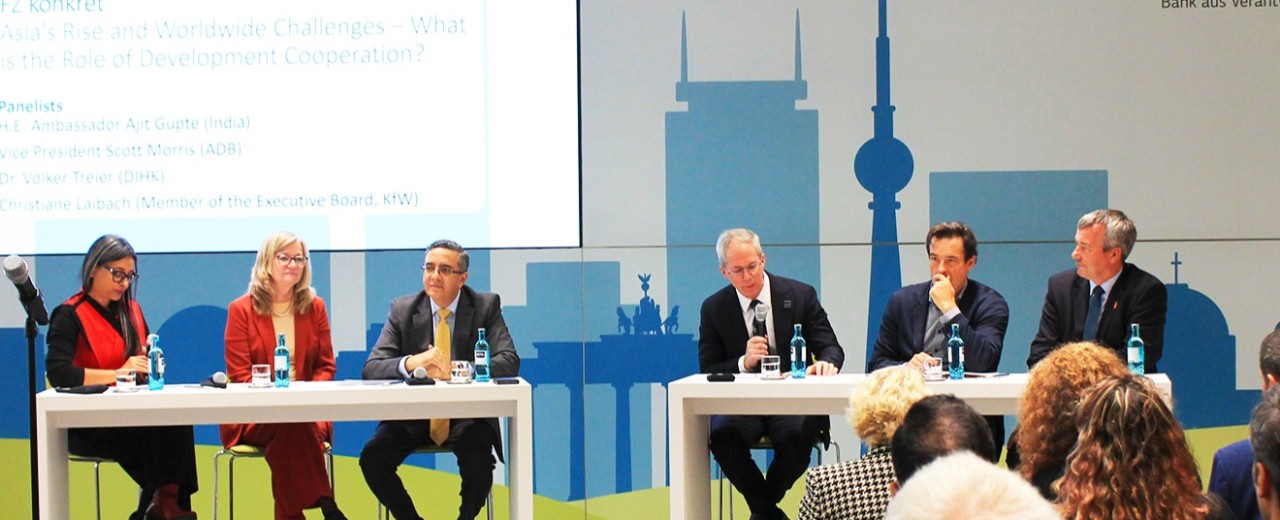News from 2025-10-08 / KfW Development Bank
Development cooperation: driving force towards a new partnership between Europe and Asia
Development cooperation: driving force towards a new partnership between Europe and Asia

We live in dynamic times. The old international order is losing acceptance, the consequences of the climate crisis are omnipresent, and the number of war victims is rising dramatically. In international development cooperation, major donors are withdrawing despite the multitude of crises. At the same time, and independently of this, the ‘Asian century’ has begun: Asia's economic development and geopolitical weight are now being felt worldwide. Over 50 per cent of the world's population lives in Asian countries. Due to the dynamics of their economic development and digitalisation, their importance within global supply chains and also as drivers of innovation, but also the level of greenhouse gas emissions, they have become a decisive global player. Without Asia, the fight against climate change and the protection of biodiversity will not succeed. It is time for Europe to review and redefine its partnership with Asia.
Development cooperation has a particularly important role to play in this. This was the conclusion reached by a high-level panel in Berlin, convened by KfW Executive Board member Christiane Laibach to discuss the reorientation of cooperation with Asian countries. Following an overview by Johann Saathoff, State Secretary at the Federal Ministry for Economic Cooperation and Development (BMZ), of around 40 years of German-Asian cooperation, Ajit Gupte, Indian Ambassador to Germany, Scott Morris, Vice President of the Asian Development Bank (ADB), and Dr Volker Treier, Head of Foreign Trade at the German Chamber of Industry and Commerce (DIHK), added their perspectives, moderated by Debarati Guha, Deutsche Welle's Programme Director for Asia. Together, they identified priorities and challenges for future development cooperation and pragmatic approaches to solving global problems in a geostrategically fragmented world.
Ambassador Gupte and State Secretary Saathoff emphasised that the German economy in particular could score points with its expertise. Beyond simply financing infrastructure such as metro lines, an important area of German-Indian cooperation, it is also important to provide environmentally sustainable concepts and appropriate technological solutions. Or climate insurance, a specialised offering from the German side that is greatly appreciated by Asian partners. German engineering expertise also provides solutions to complex challenges arising from rapid economic and population growth. Asia can build on Germany's experience in this area.
Christiane Laibach emphasised that development cooperation would continue to act as a ‘door opener’ for the German economy, particularly in advanced developing countries and emerging market economies. In addition to sales markets, however, attention would also be paid to the supply side, i.e. the development of raw material sources and other strategically important aspects for the German and European economies.
Everyone agreed that sustainability should not take a back seat to quick investments, even though there is a lot of pressure to deliver given the great need. Johann Saathoff reminded everyone that ultimately, it is about preserving the foundations of life for future generations, which was also confirmed by Scott Morris, ADB: Proof that this is also accepted among the partner countries is the bank's well-established, successful agenda for promoting renewable energies. However, it is important to work side by side with governments to shape the regulatory environment accordingly – a challenge in the face of increasing political polarisation, but one in which the bank can rely on the trust it has built up among its partners over decades. KfW is also successfully active in this area, working to improve the framework conditions for private sector investment.
Dr Volker Treier, DIHK, also emphasised the importance of sustainable projects, but called for a reduction in bureaucracy, regulation and overly detailed requirements, particularly in order to make it easier for German companies to diversify their markets, which is becoming increasingly necessary.
Innovative alliances at various levels – this is certainly one of the keys to future cooperation with Asia in the new multipolar world. Pragmatic approaches based on mutual interest are conceivable. Wherever possible and expedient, projects can be realised with the involvement of new partners and the use of new resources, including export financing and insurance instruments and private capital. Joint projects between Asian partners and German donors in Africa are already demonstrating that the changed balance of power is releasing synergies that can be used efficiently. Development cooperation makes a difference, now and in the future – the right attitude for tackling the challenge with commitment and courage. Cooperation instead of confrontation is the motto, also and especially in Asia.

Share page
To share the content of this page with your network, click on one of the icons below.
Note on data protection: When you share content, your personal data is transferred to the selected network.
Data protection
Alternatively, you can also copy the short link: https://www.kfw-entwicklungsbank.de/s/enzBWrMC.DTaA
Copy link Link copied